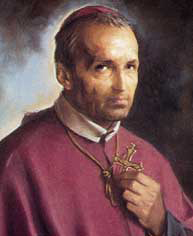
Feast of Saint Alphonsus Liguori
Scripture:
Exodus 40:16-21, 34-38
Matthew 13:47-53
Reflection:
Today is the feast of Saint Alphonsus Liguori, the founder of the Redemptorists. He was a bishop, a revered spiritual writer, and perhaps most notably, a leading moral theologian. In many ways, the Redemptorists and Passionists are “cousins.” Both orders were founded in Italy at roughly the same period and both were part of a revival in the Church that brought a new spirit of devotion and religious fervor to the church of their times. Both religious communities also stressed God’s overwhelming love expressed in the cross of Jesus which secures our redemption.
In the case of Saint Alphonsus, his writings on moral theology moved away from the rigidity and distorted asceticism that characterized so-called Jansenism, a view of Catholic spirituality that had been in vogue in the 17th and 18th centuries, and which stressed human depravity caused by sin. Alphonsus Liguori—similar to the message of Paul of the Cross, founder of the Passionists—stressed instead God’s love and mercy as the central focus of the Christian life.
The Lectionary readings for this day were not chosen specifically for the feast of St. Alphonsus. Yet their message echoes the virtues of this great saint. The reading from Exodus describes Moses preparing a simple portable shrine (referred to as the “Dwelling”) and placing the Ark of the Covenant within it and shrouding it with a veil. This desert sanctuary became the visible sign of God’s loving and protective presence with the “children of Israel.” That presence was signaled by a cloud during the day and by fire at night. Most important, the Lord would be present to the people through “all the stages of their journey.” This sense of God’s loving presence with us throughout our journey of life resonates with the emphasis on God’s love proclaimed by St. Alphonsus.
The gospel selection is from the closing section of the parable discourse found in chapter 13 of Matthew’s Gospel. The concluding saying of Jesus about the scribe trained for the Kingdom of heaven is viewed by many commentators on the Gospel as a kind of “signature” of the evangelist himself. The “scribe”—that is, a person well-versed in God’s law—is “instructed” (literally, “made a disciple”) in the Kingdom of heaven. Thus, this scribe knows the teaching of Jesus about God’s reign expressed in the healing and reconciling words and actions of Jesus himself. Additionally, this scribe is like “a head of a household”—that is, one who exercises leadership within the community of Jesus’ disciples. And this scribe brings from his “treasure” (a more literal translation of the Greek than the term “storeroom”)—that is, the place where his most precious and valuable convictions are stored— “both the new and the old.” In other words, the scribe nourishes the community of Jesus by holding on to what is most valuable in our tradition (“the old”) and, at the same time, bring forth things that are “new.”
That is precisely the role of the great saint and doctor of the Church whom we remember today. As a thoughtful “scribe,” Alphonsus Liguori remembered that trust in God’s enduring love and presence with us is a fundamental conviction never to be lost, and, at a time when some seemed to stray from that truth, he proclaimed it with new vigor and eloquence.
Fr. Donald Senior, C.P. is President Emeritus and Professor of New Testament at Catholic Theological Union. He lives at the Passionist residence in the Hyde Park neighborhood of Chicago.
